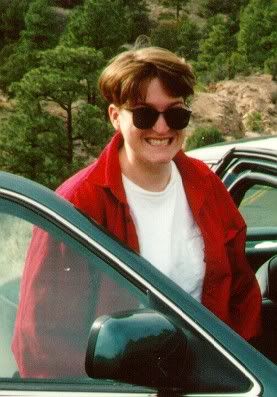Two Poems by Robert CreeleyJulie: Frankly, the second poem leaves me so cold I'm not going to say anything more about it. But the first, "Talking," is more interesting. I think it successfully captures the awkwardness of feeling out of place and struggling to join in. The language is a little flat, but that probably serves the purpose of this particular narrator. I never understand breaking a line mid-word, unless it's for humorous effect. This is, at least in my projections, a depressing poem. I find issues of alienation to be some of the most upsetting. I'm not sobbing over my Diet Coke or anything, but it touched a nerve.
---------
Oracle by Michael SpenceJulie: I read somewhere recently, on a forum or a blog, where someone wondered if the bulk of us could pick out a "male" poet from a "female" poet, and whether that would affect our impressions of a poem if we found ourselves to be wrong. It's an interesting question, and one that should be tested someday. Well, I just tested it in myself. I would have guessed this poem was written by a woman. I try to read the Verse Daily and Poetry Daily poems before looking at the authors (that doesn't work with No Tell), but I've never actually been
surprised before. It's a weird sensation. I don't know if the author's name changed my opinion of the poem. I liked it, and especially liked the last line, but I wasn't and still am not really taken with it. I am curious what Michael Spence would think of my supposition, but I'll probably never know.
---------
4. Down, from Life As A Crossword Puzzle by Noah FalckJulie: Much more engaging poem than yesterday's though this poet does tend to slip into some lazy writing. Nothing devastatingly bad, but a little ill-thought. This for example:
I think [dying] would be a lot like a day when everything goes blank.
Well, maybe it would, but what is
that like? When something is described as being like something else, shouldn't the something else be a thing the reader can relate to, without being obvious? Yes, it would be exactly like a day when everything goes blank because that's what dying is, and I don't know what it's like! "I think skydiving would be a lot like falling from a really high place." "I think drowning would be a lot like choking to death on a hot dog." That said, this is a pleasant read and the idea of a pet rock named Gomer makes me very happy.

